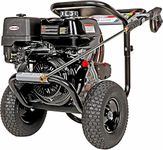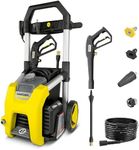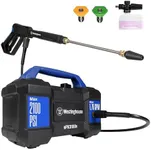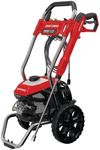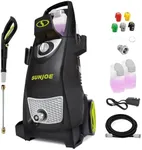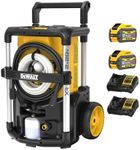Buying Guide for the Best Pressure Washers
Choosing the right pressure washer can make cleaning tasks much easier, whether you're washing your car, cleaning your driveway, or tackling outdoor furniture. The key is to match the machine's power and features to your specific needs. Understanding the main specifications will help you avoid buying a washer that's too weak for tough jobs or too powerful for delicate surfaces. By focusing on the right specs, you can ensure your pressure washer is safe, effective, and enjoyable to use.Pressure (PSI)Pressure, measured in PSI (pounds per square inch), tells you how forceful the water stream will be. This is important because higher pressure can remove tougher dirt, but it can also damage softer surfaces. Light-duty washers (up to 1,800 PSI) are good for cars, bikes, and patio furniture. Medium-duty (1,800–2,800 PSI) works well for decks, fences, and driveways. Heavy-duty (2,800 PSI and above) is best for large areas or stubborn stains. Think about what you'll clean most often—choose lower PSI for gentle cleaning and higher PSI for heavy-duty tasks.
Water Flow (GPM)Water flow, measured in GPM (gallons per minute), shows how much water the washer uses. More GPM means you can clean larger areas faster, as more water helps wash away dirt. Light-duty washers usually have lower GPM (around 1.2–1.5), while heavy-duty models can go above 2.5 GPM. If you need to clean big surfaces quickly, look for higher GPM. For smaller, detailed jobs, lower GPM is usually enough.
Power SourcePressure washers can be powered by electricity or gas. Electric models are quieter, lighter, and easier to maintain, making them great for small jobs around the house. Gas models are more powerful and portable, suitable for larger or tougher cleaning tasks, but they require more maintenance and are noisier. Consider where you'll use the washer—if you have easy access to power outlets and want something simple, go electric. If you need more power or plan to work away from outlets, gas might be better.
Nozzle TypesNozzles control the spray pattern and intensity. Most washers come with several nozzle tips, each designed for different tasks. A narrow spray (like 0° or 15°) is strong and good for tough stains, while a wider spray (like 40°) is gentler and covers more area. Some washers have adjustable nozzles or quick-connect tips for convenience. Think about the variety of jobs you'll do—if you want flexibility, look for models with multiple nozzle options.
Portability and WeightPortability refers to how easy it is to move the washer around. Lighter models with wheels are easier to transport, especially if you need to move them up and down stairs or across your yard. Heavier, more powerful models can be harder to move but may have larger wheels or handles to help. If you plan to use your washer in different locations, prioritize portability. If it will mostly stay in one spot, weight may be less important.
Hose LengthThe hose length determines how far you can reach from the machine without moving it. Short hoses (under 20 feet) are fine for small areas, but longer hoses (25 feet or more) are better for cleaning driveways, decks, or larger vehicles. If you want to avoid constantly moving the washer, look for a longer hose. Just remember, very long hoses can sometimes reduce water pressure slightly.
Detergent SystemMany pressure washers have a built-in detergent tank or a siphon tube for adding soap. This is useful for cleaning cars, siding, or anything that needs more than just water. Some systems automatically mix detergent with water, while others require manual mixing. If you plan to use soap often, look for a washer with an easy-to-use detergent system.

